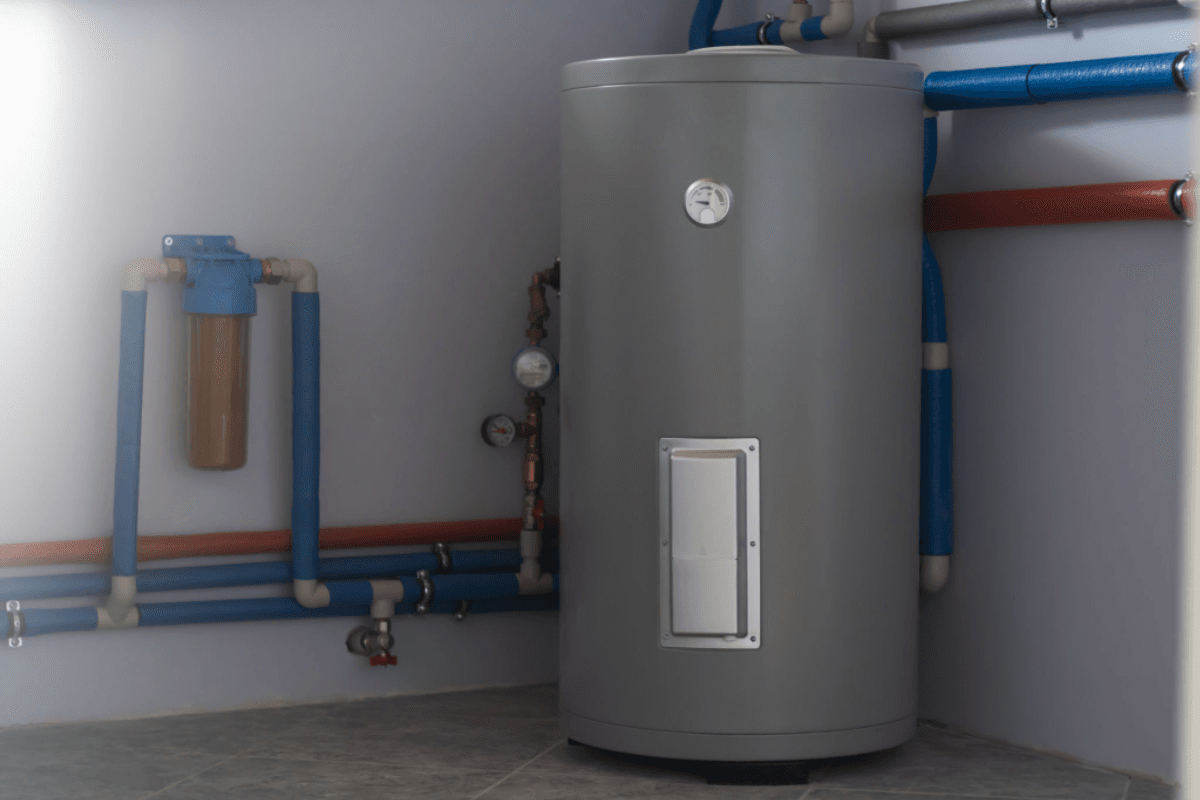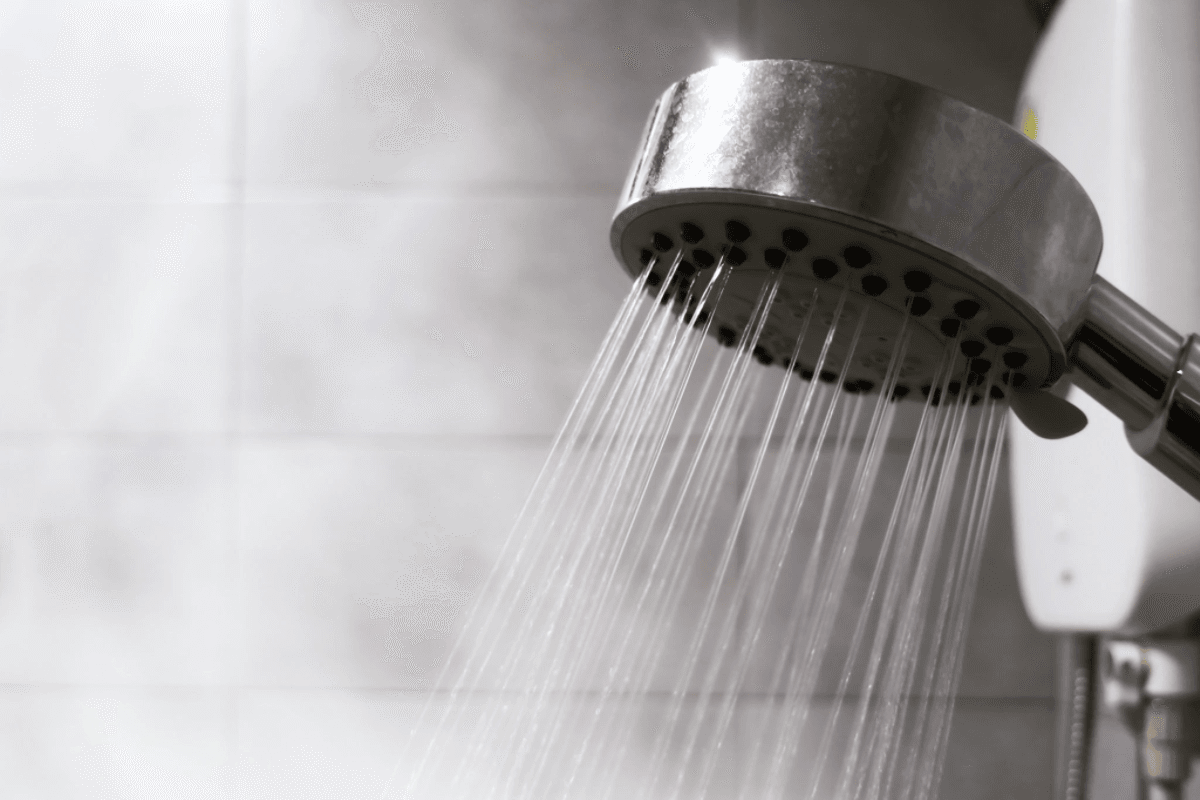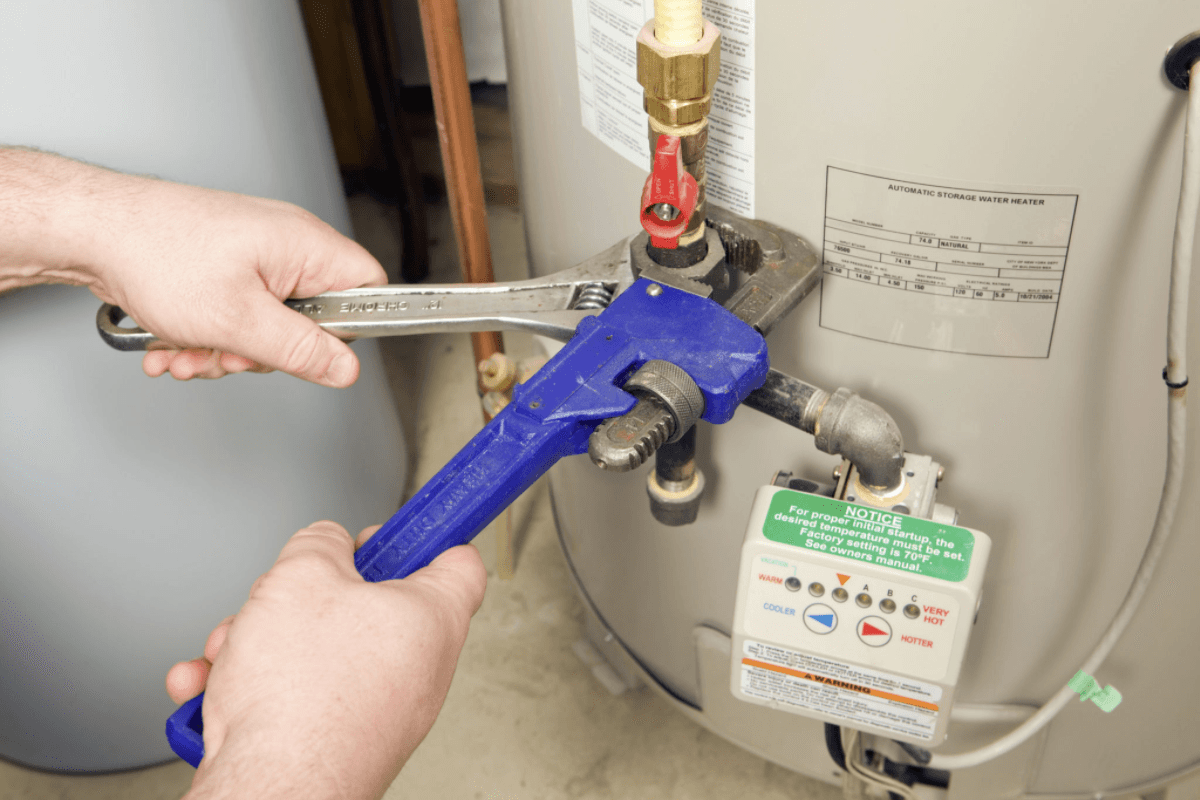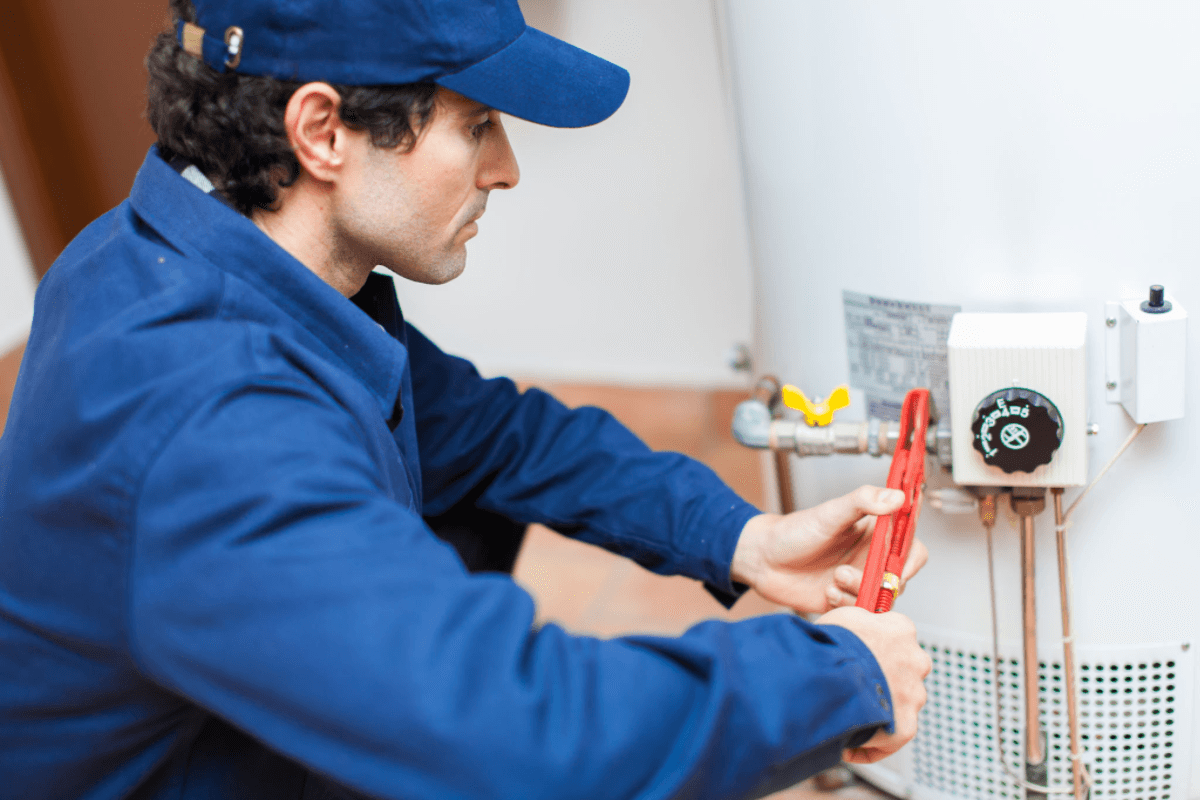Welcome to Service by Scott’s comprehensive guide on maintaining your water heater! In this article, we’ll provide you with essential tips to ensure your water heater’s longevity and efficiency, saving you from unexpected cold showers and high utility bills.
We understand the vital role a well-functioning water heater plays in your daily life. With our expertise in the plumbing industry, we’ll cover everything from understanding your water heater’s type and operation to DIY troubleshooting and the importance of professional inspections. We’ll also share energy efficiency tips and safety precautions to keep in mind during maintenance.
Whether you’re a seasoned homeowner or a first-time water heater owner, this article will empower you with the necessary knowledge to proactively maintain your water heater, ensuring its smooth operation for years to come.

Understanding Your Water Heater
Before we dive into the maintenance tips, it’s essential to have a clear understanding of your water heater. There are two main types of water heaters commonly used in households: tank-based water heaters and tankless water heaters.
Tank-Based Water Heaters
These traditional water heaters feature a large tank where water is stored and heated. The tank’s capacity can vary, typically ranging from 20 to 80 gallons. The heating element or gas burner inside the tank warms the water, ensuring a steady supply of hot water whenever you need it. While tank-based heaters can provide hot water continuously, they have a limited capacity. Once the hot water in the tank is used, it takes time to refill and reheat, leading to a temporary shortage of hot water.
Tankless Water Heaters
Also known as on-demand water heaters, these units do not have a storage tank. Instead, they heat water on the go as it passes through a heat exchanger. When you turn on a hot water tap, the cold water travels through the heat exchanger, where it gets heated instantly. As a result, tankless water heaters provide a continuous supply of hot water without the need for a storage tank. They are more energy-efficient than tank-based heaters since they don’t continuously consume energy to keep a large volume of water hot. However, tankless water heaters have a flow rate limit, meaning they might struggle to supply hot water simultaneously to multiple fixtures in large households.
Understanding how your water heater works is crucial for effective maintenance. Both types have their pros and cons, and choosing the right one for your home depends on factors like household size, hot water demand, and energy efficiency preferences.

Common Issues with Water Heaters
Regardless of the type of water heater you have, it’s essential to be aware of common issues that can arise over time. Addressing these problems promptly can prevent major breakdowns, extend the lifespan of your water heater, and keep it operating efficiently.
Sediment Buildup
Over time, sediments such as minerals, sand, and debris can settle at the bottom of tank-based water heaters. This buildup can significantly reduce the heating efficiency of the unit. As sediment accumulates, it acts as an insulating barrier between the heating element and the water. Consequently, the heating element has to work harder and consume more energy to heat the water adequately. Additionally, sediment can cause the bottom of the tank to overheat, leading to potential damage and reducing the water heater’s lifespan.
Corrosion
Corrosion is a common issue, especially in areas with hard water or high mineral content. Both the interior and exterior of tank-based water heaters are susceptible to corrosion. When the tank corrodes, it weakens the structure, increasing the risk of leaks. If left unaddressed, corrosion can cause significant damage and necessitate costly repairs or even a full water heater replacement.
Thermostat Problems
The thermostat is a crucial component that controls the water heater’s temperature. If the thermostat malfunctions, it can result in inaccurate temperature settings. This can lead to water that is too hot and potentially scalding, or water that isn’t adequately heated for your needs. A malfunctioning thermostat not only affects your comfort but also wastes energy by overheating the water.
Pressure Relief Valve Issues
The pressure relief valve is a vital safety feature installed in all water heaters. Its primary purpose is to release excess pressure inside the tank to prevent explosions. If the pressure relief valve malfunctions or becomes faulty, it can lead to dangerous levels of pressure buildup within the tank. This poses a significant safety risk, and in extreme cases, the tank may rupture or explode.
Leaking
Leaks can occur in both tank-based and tankless water heaters. In tank-based water heaters, leaks typically indicate corrosion or a failing pressure relief valve. For tankless water heaters, leaks can result from loose connections or damaged components. Water heater leaks should be addressed immediately to prevent water damage to surrounding areas.
Pilot Light Issues
For gas water heaters, a common problem is a malfunctioning pilot light. The pilot light is responsible for igniting the gas burner to heat the water. If the pilot light goes out frequently or refuses to light, it may indicate an issue with the thermocouple or gas supply.
To maintain your water heater’s efficiency and prevent major problems, regular inspections and maintenance are crucial. Flushing the tank, inspecting for leaks, testing the pressure relief valve, and cleaning the burner are essential tasks to keep your water heater running smoothly. Additionally, professional plumbing services can perform comprehensive check-ups, ensuring that any potential issues are detected and resolved before they escalate.

Regular Maintenance Tips
Regular maintenance is key to ensuring your water heater operates efficiently and reliably. By following these essential tips, you can extend the lifespan of your water heater and avoid costly repairs.
Checking for Leaks and Drips
Periodically inspect your water heater and the surrounding area for any signs of leaks or drips. Leaking water heaters can cause significant damage to your home, so it’s crucial to address leaks promptly. If you notice any leaks, turn off the water supply to the heater and contact a professional plumber to identify and fix the issue.
Flushing the Water Heater Tank
Sediment buildup is a common issue in tank-based water heaters. To prevent this, flush the tank at least once a year. Here’s how to do it: Turn off the power supply (for electric heaters) or the gas supply (for gas heaters). Connect a hose to the drain valve at the bottom of the tank and place the other end in a drain or bucket. Open the valve and allow the water to drain until it runs clear. This process removes sediment, improving the heater’s efficiency and preventing corrosion.
Inspecting the Pressure Relief Valve
The pressure relief valve is a crucial safety feature that prevents excessive pressure buildup inside the tank. Regularly test the valve by lifting the lever to allow a small amount of water to discharge. If the valve doesn’t release water or if it leaks continuously, it may be faulty and requires replacement.
Testing the Temperature and Pressure Settings
Check the temperature setting on your water heater and ensure it’s not set too high. A temperature of around 120 degrees Fahrenheit is generally safe for most households and helps prevent scalding. Additionally, check the pressure relief valve’s pressure setting, which should be between 120 to 150 psi (pounds per square inch). Adjust as necessary, following the manufacturer’s instructions.
Cleaning the Burner and Air Intake (Gas Heaters)
If you have a gas water heater, it’s essential to keep the burner and air intake clean. Dust and debris can accumulate over time, affecting the burner’s performance and efficiency. Turn off the gas supply and follow the manufacturer’s instructions to access and clean the burner and air intake.
Inspecting Anode Rod (For Tank-Based Heaters)
Tank-based water heaters have a sacrificial anode rod that prevents the tank from corroding. Inspect the anode rod regularly and replace it if it’s heavily corroded. Doing so will extend the life of your water heater.
Checking for Strange Noises
Unusual noises coming from your water heater, such as rumbling or popping sounds, may indicate sediment buildup or other issues. Addressing these noises early can prevent further damage and costly repairs.
By following these regular maintenance tips, you can keep your water heater in optimal condition and ensure it continues to provide you with reliable hot water for years to come.
DIY Troubleshooting
While some water heater issues may require professional attention, there are a few troubleshooting steps you can take on your own before seeking professional help. Here are some common DIY troubleshooting tips:
Pilot Light Issues (Gas Heaters)
If you have a gas water heater and the pilot light keeps going out, you can try relighting it following the manufacturer’s instructions. The pilot light is essential for igniting the gas burner that heats the water. If the pilot light won’t stay lit or keeps extinguishing, it could indicate a problem with the thermocouple or gas supply. In such cases, it’s best to call a professional plumber to diagnose and fix the issue.
Resetting the Circuit Breaker (Electric Heaters)
For electric water heaters, check the circuit breaker in the electrical panel. If the breaker tripped, reset it and see if the water heater starts working again. A tripped breaker can occur due to electrical issues or power surges. If the breaker continues to trip, it may be a sign of a more significant electrical problem, and you should contact an electrician or plumber for further inspection.
Replacing Faulty Heating Elements (Electric Heaters)
Electric water heaters have heating elements that can wear out over time. If you’re experiencing insufficient hot water or no hot water at all, a faulty heating element could be the culprit. With the power supply turned off, you can replace the heating element following the manufacturer’s instructions. However, if you’re not familiar with electrical work, it’s best to leave this task to a qualified professional.
Dealing with Sediment Buildup
If you notice rumbling or popping sounds coming from your water heater, it could indicate sediment buildup. Flushing the tank, as mentioned in the “Regular Maintenance Tips” section, can help remove the sediment and improve the heater’s performance. However, if the noise persists or there’s a significant amount of sediment, it’s advisable to have a professional inspect the unit.
Addressing Minor Leaks
If you spot minor leaks around fittings or connections, try tightening them with a wrench. Be cautious not to over-tighten, as it could cause more damage. If tightening doesn’t stop the leak, turn off the water supply to the heater and call a professional plumber to fix the issue properly.
Remember, while DIY troubleshooting can help with minor issues, some problems may require expert knowledge and equipment to diagnose and resolve. If you’re unsure or uncomfortable with any troubleshooting step, it’s safer to contact a qualified plumbing professional to handle the matter for you.

Hiring Professional Services from Service by Scott
When it comes to the maintenance and care of your water heater, hiring professional plumbing services from Service by Scott can make a significant difference. Our experienced technicians have the expertise and knowledge to ensure your water heater remains in top-notch condition, providing you with a reliable and efficient supply of hot water whenever you need it.
By choosing Service by Scott, you can benefit from thorough inspections conducted by our skilled technicians. They will diligently check for any signs of wear, leaks, or potential issues, allowing us to address them early on and prevent costly repairs in the future. Our experts are well-equipped to handle any necessary repairs promptly and efficiently, using high-quality replacement parts for long-lasting results and optimal performance.
Safety is our top priority, and our professionals are well-versed in safety protocols and local building codes and regulations. When you entrust your water heater to Service by Scott, you can rest assured that it will be installed, maintained, and repaired to the highest standards, ensuring your peace of mind. Additionally, we offer preventative maintenance plans that include periodic check-ups and service, helping you stay ahead of potential issues and extend the life of your water heater.
At Service by Scott, we take pride in providing top-notch service, exceptional workmanship, and prompt responses to your queries and concerns. We are dedicated to building long-lasting relationships with our clients based on trust and reliability. When it comes to your water heater’s well-being, trust the experts at Service by Scott to keep it running efficiently and ensure you have a constant supply of hot water for your household needs.
Water Heater Replacement
At some point, your water heater may reach the end of its lifespan or experience issues that cannot be efficiently repaired. When that time comes, considering water heater replacement is essential to maintain a steady supply of hot water in your home. Here are some key factors to keep in mind when contemplating a water heater replacement:
Signs that It’s Time for a New Water Heater
Several signs indicate that your water heater is approaching the end of its useful life. These signs may include frequent breakdowns, leaks that cannot be repaired, rust or corrosion on the tank, and a noticeable decline in hot water supply or heating efficiency. If you notice any of these red flags, it may be time to start exploring replacement options.
Choosing the Right Water Heater for Your Home
With advancements in technology, there are various water heater options available to suit different needs and preferences. When considering a replacement, you can choose between traditional tank-based water heaters and tankless water heaters. Tank-based heaters store and heat water in a reservoir, while tankless heaters heat water on demand. Tankless heaters are more energy-efficient, as they only heat water when needed, but they may have limitations in supplying hot water simultaneously to multiple fixtures in larger households.
Benefits of Upgrading to a Tankless Water Heater
If you’re looking to make a change, upgrading to a tankless water heater can offer several benefits. These include energy savings, as tankless heaters don’t constantly consume energy to keep a large volume of water hot. Additionally, tankless heaters are more compact, taking up less space in your home. However, it’s essential to consider your household’s hot water demand and the number of fixtures used simultaneously to determine if a tankless water heater is the right fit for your needs.
When contemplating water heater replacement, it’s crucial to assess your current unit’s condition and consider your household’s hot water needs. Consulting with a professional plumbing company, such as Service by Scott, can help you make an informed decision regarding the best water heater replacement option for your home.
Conclusion
Maintaining your water heater is vital for ensuring its longevity, energy efficiency, and your family’s comfort. By following the regular maintenance tips outlined in this article, such as checking for leaks, flushing the tank, inspecting the pressure relief valve, and cleaning the burner, you can keep your water heater running smoothly and prevent common issues like sediment buildup and corrosion.
In addition to DIY troubleshooting, hiring professional services from Service by Scott can provide you with expert assistance and peace of mind. Our experienced technicians will conduct thorough inspections, handle any necessary repairs, and offer knowledgeable recommendations to keep your water heater in optimal condition. With safety as our top priority, you can trust that your water heater will be maintained, repaired, and installed in compliance with industry standards and regulations.
If your water heater is reaching the end of its useful life or experiencing frequent issues, considering a water heater replacement may be the best course of action. Upgrading to a tankless water heater can offer energy savings and space efficiency, but it’s essential to assess your household’s hot water needs before making a decision.
Contact Service by Scott today for all your water heater maintenance, repair, and replacement needs. Our dedicated team is committed to providing top-notch service and ensuring your water heater continues to provide you with a reliable and efficient supply of hot water for years to come.
FAQs
How often should I flush my water heater?
Flushing your water heater once a year is generally sufficient to remove sediment and maintain its efficiency. However, if you notice excessive sediment buildup or experience hard water in your area, you may consider flushing it twice a year.
Can I perform maintenance on my water heater myself?
Yes, you can perform basic maintenance tasks such as checking for leaks, inspecting the pressure relief valve, and cleaning the exterior of the unit. However, for more complex issues, like repairing heating elements or addressing gas-related problems, it’s best to rely on professional plumbing services to ensure safety and proper repairs.
Is it normal for my water heater to make noises?
Some noises, such as minor popping or cracking sounds, are normal, especially during the heating process. However, loud banging or rumbling noises could indicate sediment buildup or other issues. If you hear unusual noises, it’s a good idea to have your water heater inspected by a professional.
Should I repair or replace my water heater if it’s leaking?
The severity of the leak determines whether repair or replacement is the best option. Minor leaks around fittings or connections may be fixable with simple repairs. However, significant leaks or leaks from the tank itself may indicate irreparable damage and the need for a replacement. It’s essential to have a professional plumber assess the situation to provide the most appropriate solution.
Are tankless water heaters worth the investment?
Tankless water heaters can be a worthwhile investment for many homeowners. They offer energy savings by heating water on-demand, eliminating the need to keep a large tank of water constantly hot. Additionally, tankless heaters have a longer lifespan than tank-based heaters. However, the decision depends on your household’s hot water demand and upfront budget, as tankless water heaters generally have a higher initial cost.

